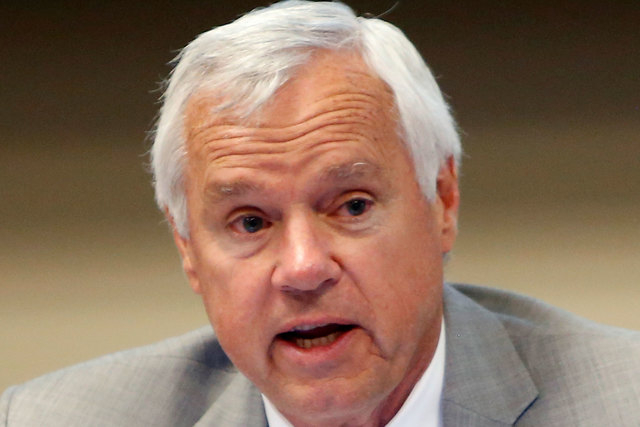Chancellor Dan Klaich can’t seem to get out of his own way

Always thought Chancellor Dan Klaich was a straight shooter, but after a series of questionable actions on his part, I’m starting to have doubts.
The shift began with accusations of plagiarism in late 2014 uncovered by the Review-Journal’s Bethany Barnes. Then it was heightened by a questionable hiring. My doubts intensified recently with Klaich’s efforts to soften criticism of management of the community college system, also uncovered by Barnes.
Plagiarism seemed like something the Nevada Board of Regents would investigate. But they didn’t.
The regents let the opposing sides kiss and make up and decided against bothering to investigate whether Frank Woodbeck, part of Klaich’s cabinet overseeing the Nevada System of Higher Education, plagiarized an early draft of a report by the Brookings Mountain West. Both Brookings Mountain West and the state system prepared reports for the 2015 Legislature regarding a grant program to improve the workforce in science, technology, engineering and math.
Except the system’s report lifted chunks of the Brookings’ draft report verbatim and without attribution and submitted its report first, making it look like Brookings was taking ideas from the higher ed system.
Klaich claimed he had permission to use Brookings’ work. However, the lead author, Brookings’ Mark Muro, was the one who first questioned why his work was used without attribution. Seems like a significant issue worth investigating, but the regents let it pass.
Earlier, I had doubts when Klaich announced in late November he had hired the soon-to-be-jobless Attorney General Catherine Cortez Masto when her term ended to be his new executive vice chancellor. That $215,000-a-year job lasted just long enough for her to be blessed as an heiress apparent by retiring U.S. Sen. Harry Reid, D-Nev.
She held the executive vice chancellor’s post from January to early April, resigning soon after Reid announced March 20 he would be retiring and hoped she would run.
No one holds the executive vice chancellor’s job now, leading me to conclude it was a juice job, but not the first in Nevada’s higher ed system. Klaich said he recruited her.
Since Reid’s announcement to retire had been a closely held secret, maybe Klaich thought and Cortez Masto intended to work longer. Or possibly this was simply a convenient place to park the unemployed politician. It was no secret that Cortez Masto had higher political ambitions, so she was not expected to be a long-timer with the university system.
Her political website doesn’t even mention the three-month stint in the No. 2 job with Nevada’s higher education system. She has legal and administrative experience, but the only educational experience she had was attending universities, not overseeing them.
Last Sunday, Barnes’ page-one story rattled Klaich’s cage again, based on internal email between him and his top advisers. It is obvious that a May 28 draft report involving how to improve Nevada’s community colleges was extensively rewritten because it gave him heartburn.
The case of the rewriting of the so-called “independent” study reflects poorly on Klaich as well as the National Center for Higher Education Management (NCHEMS), which bent over to change its report and make Klaich a happy and repeat customer.
I’m losing confidence in Klaich, an attorney, whom I’ve known professionally since he was elected a regent in 1982. He held top jobs as executive vice chancellor, vice chancellor for legal affairs and administration, and chief counsel. He nabbed the top job as chancellor in 2009. I never worked closely with him, but overall thought he was good at the various jobs he held.
Now it looks strongly as if he believes the chancellor’s job description means softening critical reports.
In a series of email starting May 31, Klaich consulted with his cabinet of top officials about NCHEMS’s May 28 draft, which criticized management of the higher education system including “institutional leadership that fails to nurture all components of the college’s mission.” That’s not in the final report.
He said in a June 29 memo to the regents that information published in the Review-Journal has lacked context. But how much context is needed when anyone can read the email, attached to Barnes’ stories on the Review-Journal website?
Either keep the report as an internal document and don’t disclose it to the Board of Regents or insist on a major rewrite softening the report.
It was rewritten. “Now let’s hope the report is what we need and want,” he wrote after a series of discussions with NCHEMS officials Dennis Jones and Aims McGuinness.
So the 12-page draft report was reduced to seven pages in the June 23 version. Among the recommendations deleted was to hire a vice chancellor for community colleges, someone with experience at the level of president or vice president at a community college, not just an administrator. That’s gone but not forgotten.
The ultimate goals of the system’s top bureaucrats seemed obvious. Cover their fannies through damage control. Keep their power centralized.
Meanwhile, the losers are community college students who deserve better as they try to improve their lives through education.
Jane Ann Morrison’s column usually appears Thursdays. Email her at jmorrison@reviewjournal.com or leave a message at 702-383-0275. Follow @janeannmorrison on Twitter.